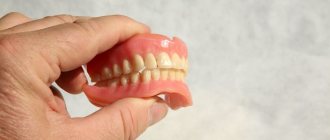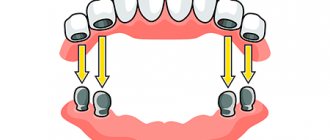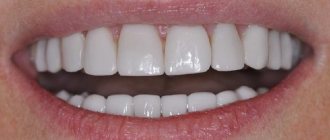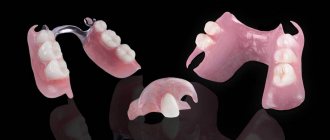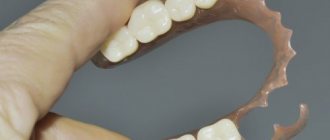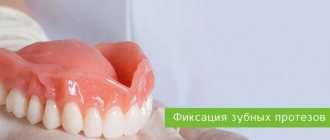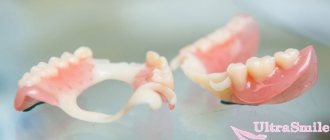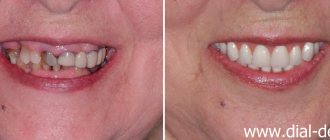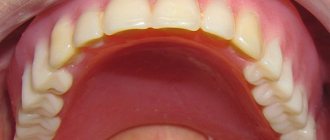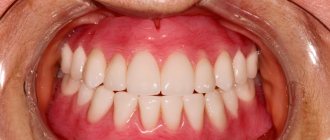The youthful glow of a smile, laughter without embarrassment or worry, food without problems - of course, high quality removable dentures have many qualities that can improve your daily life, especially once you get used to them. This usually takes time and patience, but you will certainly feel comfortable in the future. To help you get through this adjustment period, we'll give you some tips.
At first, you will most likely feel extremely uncomfortable when talking or trying to chew food with your dentures - new sensations have appeared, something new and strange is present in your oral cavity. Moreover, if your new denture rubs against the unusual gum and the pain from abrasions is added to the feeling of discomfort. The most important thing during this period is to quickly overcome these fears and forcefully forget that something is bothering you in your mouth. This is achieved by persistently constantly wearing a removable denture. As they say, patience and work. Removing them at night or before meals will only prolong the adaptation period. Therefore, be very meticulous in cleaning your dentures and mouth shortly before bed, but then put the new pullers back on, maybe even through the pain.
Do not be lazy to brush the remaining teeth and the mucous membrane itself in contact with the denture. Only careful hygiene will speed up the healing of abrasions. If there are two or three teeth left in the mouth, they help fix the prosthesis and facilitate the adaptation period. These teeth must be cleaned very thoroughly.
Sometimes people want to get rid of their remaining teeth. Should not be doing that. If there is no pain, let them stand their time, they promote fixation.
Possible causes of discomfort
- rehabilitation period: the process of getting used to removable devices is not easy. For some people, the sensation of a foreign body in the mouth persists for 1-2 months, while others cannot get rid of it throughout the entire period of use. Moreover, the more teeth were missing at the time of prosthetics, the more discomfort the patient may feel, because the bite has been disturbed for a long time, and it is quite natural that the restored normal position of the jaws initially causes discomfort,
- the bulky base of the product and the presence of a massive palatal overlap: almost all removable devices have these disadvantages. On the one hand, such design features allow the devices to fit well in the mouth. On the other hand, they cause significant inconvenience, pressure, rubbing,
- an incorrectly or poorly manufactured structure that does not correspond to the individual anatomical characteristics of the patient,
- inflammation of the mucous membranes of the oral cavity and gums: often people who wear removable systems develop denture stomatitis, gingivitis and periodontitis,
- atrophy of bone tissue and uneven relief of the alveolar ridge: inevitably occurs during the operation of any removable systems,
- poor oral hygiene and insufficient care of the removable structure: simply, if you haven’t cleaned your mouth after eating, irritation is caused by crumbs stuck in the gaps,
- eating tough and hard foods: unfortunately, when wearing removable systems, the patient must constantly observe dietary restrictions, otherwise the devices may become deformed, cause pain and chafing,
- long service life of the system: after a certain time, any, even the most high-quality removable denture needs correction and relining,
- the patient’s psychological unpreparedness to wear removable systems: psychologists and researchers highlight such a factor as “rejection” of structures even despite their full compliance with the requirements1,
- breakdown of the device, appearance of cracks and chips on the prosthesis base,
- an allergic reaction to the materials from which the product was made: most often occurs to metal fastening elements, acrylic, nylon. Then the discomfort is accompanied by a burning sensation, itching.
The cause of the problem may be a bulky denture.
Read the article on the topic: 4 points to pay attention to when choosing removable dentures.
Now we will present you with tips that can help alleviate the situation somewhat.
Gum treatment methods
Manipulations depend on the reason:
- in case of allergic reactions, the base is changed to hypoallergenic (nylon, AcryFree), antihistamines are prescribed;
- for papillomas, excision surgery is performed;
- when a removable denture rubs, a correction (relining) is made;
- if the crown falls off, it is soldered back.
To soothe gum inflammation, ointments, infusions and lotions are used.
Pharmacy products:
Kamistad, Metrogyl Denta, Solcoseryl, Cholestal, Asepta. These gels and pastes have analgesic and anti-inflammatory effects. Before applying them to your gums, read the instructions carefully.
Disinfectant solutions:
chlorhexidine, furatsilin, destroy pathogenic flora.
Home remedies:
applications of sea buckthorn and rosehip oil. Rinse in the form of infusions of sage and plantain. Solutions of soda and salt also soothe irritation in the mouth.
Recommendation #1. Use products from the pharmacy
If you are not ready to see a doctor right away or cannot do this for objective reasons, then try to solve the problem with the help of various medications:
- medicinal and anti-inflammatory gels (“Cholisal”, “Solcoseryl”): the products help relieve the inflammatory process, relieve pain, promote rapid regeneration of damaged tissues, disinfect and prevent pathogenic bacteria from entering the mucous membrane,
Ointment can be used to relieve symptoms - self-absorbable collagen plates for gums (for example, “Farmadont”): contain sage, rose hips, chamomile. They have antiseptic, cooling, regenerating, soothing properties. They can be used in the complex treatment of stomatitis, gingivitis and periodontitis,
- pads (“Protefix”) and fixing creams (“Korega”, “President”): improve the quality of fixation of the prosthesis in the oral cavity, due to which it stops moving and rubbing. They create an airtight layer, so pieces of food do not get clogged between the structure and the gum, which again contribute to irritation of delicate tissues,
For better fixation of the prosthesis, you can use special fixing creams. - rosehip and sea buckthorn oils: have a calming and regenerating effect,
- rinsing with drugs such as Miramistin, Chlorhexidine, chamomile and sage: have an antiseptic effect, prevent the development of the infectious process, help reduce sensitivity, activate local immunity, and start the process of tissue regeneration.
“I rubbed my gums with a prosthesis and didn’t know how to treat it. I went online and honestly, gentlemen, I was horrified. Some craftsmen seriously suggest using a file or sandpaper to adjust or grind down artificial material. I'm shocked! This is some kind of last century, so you can completely damage the prosthesis, and even seriously injure your gums with this homemade sawed product!!!”
Natali, fragment of a review from the dental portal gidpozubam.ru
The listed means are good for protecting the mucous membrane both during the process of adaptation to a removable structure, and after habituation. They will help relieve unpleasant symptoms until you see an orthopedist and receive qualified help. They can also be used after consulting a doctor.
Pharmacy medications will bring significant relief if the prosthesis was really well made and does not yet need correction. Otherwise, medicinal ointments and pads will have a temporary and very short-lived effect.
Signs that your gums are inflamed
To prescribe correct and effective treatment for inflammation under the prosthesis, it is extremely important to correctly diagnose the cause. Below you can find out the main symptoms indicating an inflammatory process are as follows:
- Redness in the area where the gum comes into contact with the denture. The inflammatory process can spread quite quickly.
- Bleeding gums when brushing teeth or eating.
- Pain and discomfort while eating.
- Anti-inflammatory drugs do not help, or relieve redness for a short period.
- Bad breath may indicate inflammatory processes.
- Noticeable swelling of the gums.
Recommendation #2. Give the prosthesis for relining and correction
People planning to install removable dentures should understand that the structures periodically need correction and relocation to suit the characteristics of the jaw bone tissue and mucous membrane, which gradually atrophy, that is, decrease in volume.
If the device has just been manufactured and fixed, then in the first months about ten corrections may be required. Moreover, the fewer teeth you had at the time of prosthetics, the more visits you will have to make to the clinic. You need to understand that the bite has been broken for a long time, so even the most well-designed prosthesis can cause discomfort at first.
Relining the prosthesis can help reduce discomfort.
After getting used to and normalizing the bite relationship, we also shouldn’t forget about corrections. They need to be done approximately once every 6-12 months. Otherwise, the structures will begin to shift, rub, and fall out of the mouth.
Does the prosthesis press and rub? Make an appointment with a doctor, but before visiting the dentist, try to walk with a removable device for at least 3-4 hours, so that the orthopedist can use the mark left on the soft tissues to assess which area should be given special attention and what adjustments need to be made according to the situation.
Reasons why denture chafing may occur
The removable dental structure itself is not ultra-precise. The stages of its manufacture consist of taking an impression, casting, modeling in wax and making a prosthesis from plastic, processing the finished model for installation. It is very difficult to take into account all the smallest tubercles and depressions that are necessarily present in the relief of the jaw. And the material from which the plates are made is most often harder than the soft tissues of the oral mucosa.
Therefore, even with the most precise manufacturing of removable plates and the high skill of the doctor, all the inconveniences regarding chafing from dentures at any stage of their use cannot be avoided.
Why and when can chafing occur when wearing removable dentures?
Most often this happens:
- After initial application. At the same time, the formation of the so-called “prosthetic bed” located in the area of the mucous membrane in contact with the prosthesis. Discomfort here is quite normal (lasts from 1 to 3 months). The appearance of namins (or abrasions) during this time of wearing dental structures is completely justified. After all, the body needs time to adapt to a foreign device.
- As a result of improper donning. If you put on even a perfectly fitted prosthesis incorrectly, it will begin to injure and rub the mucous membrane. Each removable structure has its own dressing path (front to back or back to front) that should allow it to “fall” into place.
- After 5 years of wearing. Here, chafing appears due to atrophy and shrinkage of the jaw bone tissue along with the mucous membrane covering it. At the same time, the hard part of the base of the plates remains unchanged, which leads to violations of the correspondence between the jaw and the prosthesis and the formation of unnecessary cavities. The pain is especially acute during chewing, when the structure stops lying tightly on the gum and begins to move, causing pain. At the same time, abrasions appear and then disappear.
By the way, many dentists believe that if there are frequent complaints about rubbing of a removable denture after wearing it for some time (more than 5 years), it is not enough to just adjust the “false jaw.” Often, replacement with a new design that takes into account all the changes that have occurred in the jaw is strongly recommended.
Recommendation #3. Exchange your old denture for a new one
If, after examination by a doctor, it turns out that the product cannot be adjusted or repaired, it will have to be replaced to avoid discomfort and chafing. But remember that when the doctor installs a new structure, during the period of getting used to it, it is important to pay attention to the slightest inconvenience and report them to the orthopedist so that he can make timely adjustments and adjust the new teeth to your individual characteristics.
We list the cases in which it may be necessary to manufacture a new device:
- an allergic reaction to the materials of the old prosthesis occurred,
- the structure has become deformed, broken, or irretrievably lost its visual appeal due to poor-quality hygienic care or its complete absence,
- the clinical situation in the oral cavity has changed: for example, the patient wore a partially removable device, but his teeth, which acted as supporting teeth, collapsed or fell out,
- The service life of the system and the materials used to create it have expired: the service life of removable devices is very short. The best of them, for example, Acry-Free, clasps and Quattro Ti can last up to 5-7 years, and nylon and acrylic ones must be replaced after 2-5 years.
If the structure breaks down, you should replace it with a new one.
It is very important that at the stage of preparation for prosthetics, the specialists of the clinic where you contacted carry out a comprehensive comprehensive diagnosis of the condition of the maxillofacial apparatus. Doctors of the most innovative dentistry today use mainly digital equipment and software in their work, which allows them to identify all functional disorders of the umbilical nervous system and create a truly comfortable prosthesis that will help correct all defects.
How to prevent denture chafing
No one can give a 100% guarantee that addiction will go smoothly. The grinding-in process is too individual. But there are a few tips that will help you avoid unpleasant moments. It's better to use them. For example:
- take oral hygiene and denture cleaning seriously - plaque accumulation and food debris can complicate the situation. For disinfection you need to use special tablets.
- give up chewing gum, toffees and other viscous and sticky products, and do not chew hard vegetables, fruits or nuts; it is better to chop them before eating;
- for a strong connection with the oral mucosa, it is worth using special gels and powders;
- Visit your dentist regularly and do not forget to reline once a year. The bone tissue continues to thin and gaps appear between the palate and the plate, causing discomfort;
- Only a professional orthodontist can repair, grind and adjust the device.
Of course, all patients would like to avoid the difficulties of getting used to a new jaw, to do without chafing gums and scratches. What to choose? Nylon prostheses, as well as hypoallergenic acrylic Acry-Free, are considered convenient and comfortable, but they are not suitable for everyone. The simplest and cheapest plastic plates can be the most difficult to get used to. The presence of metal parts in the structure often provokes allergies.
Your doctor will help you choose the right prosthesis for you. Depending on the condition of your teeth, financial capabilities and desired results, they will select the best option for you and help you go through the adaptation period as easily as possible.
Recommendation #4. Get dental implantation, that is, change your removable denture to a better solution
If you are tired of many uncomfortable moments (and this is not only rubbing of the mucous membranes, but also impaired diction, the inability to eat your favorite foods, the gag reflex, and others) that arise when using removable devices, then it’s time to move to a fundamentally new and higher quality level of life.
Typically, removable systems are worn by people with multiple and complete edentia (when there are no teeth at all). For such patients, the best and most correct solution is to replace removable devices with non-removable ones, fixed on analogues of the roots of natural teeth - implants. And one-stage implantation with immediate loading will help achieve this goal.
When implanted with immediate loading, the prosthesis is installed within 3 days
This approach is good because the patient receives a permanent and fully functional prosthesis, which is securely fixed in the oral cavity already 2-3 days after the implantation of artificial roots. One-stage implantation protocols make it possible to do without bone grafting and without mucosal grafting, and these manipulations in most cases are necessary for those who have used removable dentures for a long time.
Fixed structures, which are fixed to implants according to one-stage treatment protocols, have a beautiful gingival contour, as well as a metal base that stabilizes and unites the entire system into a single whole. Due to this, already during the rehabilitation period the patient begins to eat his favorite foods, smiles freely, and does not worry that the structures will fall out or rub the mucous membrane.
Advantages of prosthetics on implants
- Bone tissue does not decrease, the facial contour is preserved, the smile looks younger;
- the supporting teeth do not deteriorate;
- any number of teeth are restored;
- immediately after implantation, a temporary prosthesis or a permanent ceramic-composite structure is put on (using the Resmile method);
- there is no problem with suction (as in removable ones), the structures are fixed with screws or dental cement.
Work of ROOTT dentists on implant prosthetics for periodontal disease
Symptoms for which you need to see a doctor
If you have just recently restored your teeth, and the dentures are rubbing the mucous membrane, then what should you do? There is no need to worry right away, because the soft tissues of the oral cavity need time to adapt and get used to the foreign object. For this reason, doctors do not even recommend removing the structure in the first days and nights (for at least 2 weeks). If you understand that the pain is getting worse, your gums are inflamed, and life with a prosthesis already seems unbearable, then it makes sense to consult a doctor.
You should be concerned if ulcers appear in your mouth
Read the article on the topic: 5 tips on how to get used to removable structures.
You should also be alert to other symptoms that indicate that you cannot do without the help of a professional:
- the prosthesis does not stay in the mouth at all, moves and falls out,
- a rash and ulcers appeared on the soft tissues of the oral cavity,
- salivation increased or, conversely, decreased, dryness appeared,
- itching, burning and pain of the mucous membrane,
- change in the shade of the mucous membrane from pale pink to red and bluish,
- the appearance of plaque and bad breath,
- bleeding gums,
- unpleasant sensations on the inside of the cheeks, lips,
- pain when closing the jaws and when chewing food.
In case of the unpleasant moments listed above, it is better to immediately consult a doctor who will conduct an examination, determine the exact cause of the problem and solve it at a professional level.
Notice
: Undefined variable: post_id in
/home/c/ch75405/public_html/wp-content/themes/UltraSmile/single-item.php
on line
45 Notice
: Undefined variable: full in
/home/c/ch75405/public_html/wp-content /themes/UltraSmile/single-item.php
on line
46
Rate this article:
( 11 ratings, average: 4.82 out of 5)
prosthetics
- Fastovets E.A., Glazunov A.O. The influence of the efficiency and quality of manufactured removable dentures on the standard of living of patients with complete absence of teeth // Modern dentistry. – 2016.
Expert “If a denture rubs, then patients begin to suspect the unprofessionalism of the doctors who created and installed it. But even well-made and perfectly fitted removable devices can cause problems over time - and it is important to understand this immediately, even BEFORE installing such a design. Discomfort occurs due to the fact that underneath them the bone tissue sags and decreases in volume along with the gums. As a result, the prosthesis no longer adheres evenly to the mucous membrane, does not hold well in the mouth, does not distribute the chewing load correctly, and this leads to pain, injury, and inflammatory processes.” Orthopedic dentist Sambuev Bair Sergeevich
Consulting specialist
Sambuev Bair Sergeevich
Specialization: Orthopedic dentist Experience: 11 years
What to do if the discomfort from wearing a removable denture does not go away?
At the initial stage of adaptation to the prosthesis, the gums may hurt a little. If the lower prosthesis rubs or the palate rubs with the prosthesis during the first stages of wearing a removable orthopedic structure, this is completely normal. However, if the problem persists, contact your dentist. If he finds that the denture is not adjusted correctly, replacement may be necessary, since a denture that does not fit the anatomy of your jaw can cause sores or even infections. If we are talking about the need for adjustment, then in one visit to the doctor you will solve your problems.
Comments
What happens if you continue to endure pain? My grandmother wears a removable denture and complains that it has been rubbing a lot lately, but we can’t find convincing arguments for her to finally go to the doctor...
Vera Anatolyevna (10.13.2020 at 21:15) Reply to comment
- Dear Vera Anatolyevna, if you do not take any measures to eliminate the problem, then very painful ulcers will form in the area of rubbing the mucous membrane, and an acute infectious-inflammatory process may also occur, which will gradually lead to necrosis, that is, the death of cells and tissues, osteomyelitis and phlegmon. Systematic tissue trauma can also become a prerequisite for the development of oral cancer.
Editorial staff of the portal UltraSmile.ru (10.15.2020 at 09:27) Reply to comment
How can you generally avoid such situations when the prosthesis begins to rub your gums?
Antipeev Yu.M. (10/31/2020 at 5:17 pm) Reply to comment
- Firstly, only undergo prosthetics from experienced orthopedists. Secondly, when using the prosthesis, follow these rules: after eating food, remove the prosthesis and clean it thoroughly, and rinse your mouth. If discomfort occurs and it does not go away for a long time, consult a doctor who will examine and correct the product. It’s even better if you visit a specialist every six months, undergo preventive examinations and professional hygiene, because artificial teeth require no less attention than natural teeth. And one more piece of advice: if you wear removable dentures, do not forget about dietary restrictions, refuse to eat hard, tough, viscous foods.
Editorial staff of the portal UltraSmile.ru (06.11.2020 at 09:38) Reply to comment
Hello! My dad recently received a removable denture. He says that everything is fine and suits him, like you need to get used to it. But at the same time, it hurts a little to close your jaw, and to eat too. Tell me, should this go away, or is there something wrong with the prosthesis?
Stanislav P. (11/20/2020 at 7:37 pm) Reply to comment
Good evening! Please tell me, are there any contraindications for installing a fixed prosthesis? Can a person develop an allergy to metal during such a procedure?
Anna Novikova (11/20/2020 at 7:39 pm) Reply to comment
Hello! My mother is 72 years old and had dentures installed last year. Everything was fine, but in September he flatly didn’t want to put on implants. He says they are rubbing it. They wanted to take her to the dentist, but now she has a migraine. Question: why did the dentures begin to rub only after almost a year?
Erica (11/20/2020 at 7:58 pm) Reply to comment
Only periodic adjustments will save you from chafing. Because the area of removable teeth can put pressure on the gum in some area. The only option is to cut it down. Then it will be a little easier.
Anton (11/20/2020 at 09:34 pm) Reply to comment
What can you do if after three months you still have discomfort from wearing removable dentures? Sometimes inflammation also appears. Is it possible that the design itself will have to be redone?
Inna (11/20/2020 at 9:46 pm) Reply to comment
Write your comment Cancel reply
Contraindications to professional cleaning
Like any health procedure, professional oral care has its contraindications. You should not agree to brush your teeth if you have the following diseases:
- mucosal injuries;
- hepatitis B and C, HIV, AIDS;
- poor blood clotting;
- pathologies of the respiratory system;
- allergy to fluoride-containing drugs;
- any serious diseases of internal organs;
- diseases of teeth and gums in the acute phase.
Stock
-9%
BASAL COMPLEX - Restoration of teeth on 1 jaw in 3 days 330,000 rub.
300,000 rub.
get -20 %
Manufacturing of removable denture Acry Free 40,000 rub.
32,000 rub.
get -47 %
Dental implant Osstem 35,000 rub.
18500 rub.
get -10 %
Internal braces Win 200,000 rub.
180,000 rub. get
Symptoms of gum injuries
Patients usually notice acute injuries immediately, while signs of chronic injuries may appear gradually. At the first stage, symptoms of inflammation appear, the mucous membrane turns red and swells. Painful sensations appear when pressing on the injured area. If the damage is mechanical, the injured area on the mucosa is usually clearly visible. With regular chemical or thermal burns, an eroded area appears on it, which becomes covered with a gray coating and bleeds easily.
Without treatment, the gum condition may worsen:
- an ulcer with a dark surface appears on the injured area;
- serous or purulent discharge appears;
- a wound may form with swelling around it. Its edges are usually roughened, and it bleeds easily;
- severe pain in the affected area appears.
